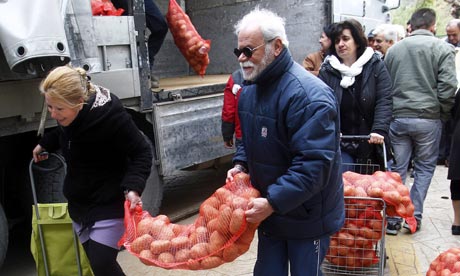Jon Henley guardian.co.uk, Wednesday 14 March 2012 09.47 GMT
Jon Henley hears from expats about cynicism at school, scepticism at work and stoicism at the allotment
Athens residents carry sacks of potatoes distributed by farmers. Photograph: Alexandros Vlachos/EPA
As well as Greek citizens, expatriates have been in touch with their impressions of their adopted homeland in crisis. Here are a few:
Sara Young in Thessaloniki writes:
It is becoming increasingly difficult. In Thessalonik i, as across the whole country, it is the uncertainty and the daily struggle that are wearing people down.
Whatever decisions are being made in Europe seem to have less and less connection with what is happening in reality in our city.
Here are some examples of daily life among teachers and academics. An adult student of mine – a kindergarten teacher – telephoned to postpone our lesson because she wanted to join the queue for cheap potatoes that are being sold through the so-called "potato movement", the initiative originally started through the university.
At the same time, Thessaloniki city council has started an allotment scheme for those wanting to grow their own food, while the university is giving free advice on crop cultivation. But still a sense of despair pervades the city. While people are rightly concerned about the effect on the youth of Greece (50% unemployment), it is also affecting the teenagers, who are disillusioned in turn and see no future.
Trying to teach has become a struggle against justifiable apathy and cynicism. Why study, the pupils ask, when they see often highly qualified older family members without work? For teachers, it is a daily challenge to maintain morale, even while we ourselves are not paid on a regular basis.
A friend tells me he hasn't been paid at all since October. If he quits his job, he will never see the money owed to him. In the light of that, I'm celebrating the fact that I was actually paid the whole of January's salary – the final €50 owing was paid last Friday (9 March). But as for February's …
Rebecca Hall has this:
I'm a British expat who lives in Athens. I teach English for a multinational organisation, but even they are suffering, in terms of student numbers. My job is precarious and I never know if I will have work from one year to the next.
The contract they have me working on allows them to fire me at the end of the academic year, then rehire me. Thus I do not get my IKA (national insurance equivalent) contributions paid for two months, and I have to "sign on" for benefits. Even this has been reduced by 22% (€450 last year, God knows what this year).
The cost of living seems to rise and rise. I have more Greek than English friends: one of them works for ATE bank, and has seen her salary slashed. Luckily, she is one of many Greeks that still lives in a family-owned apartment (outright home ownership is big here, still).
Another friend is a self-employed dentist. She is actively seeking work in Italy now. She sees no future for herself here any more. As a teacher, despite a drop in student numbers I have seen a rise in demand for IELTS English, the exam any non-English person needs to pass to study in an English-speaking country. People are looking to leave in droves.
Chris Murphy lives in Komotini, in Thrace:
Recently a despairing, 52-year-old former employee of a wheelie bin factory here held two hostages at gunpoint at his former workplace. He had earlier shot and wounded two former colleagues, whose injuries were not life threatening.
The hostages were released after a 12-hour standoff with the police: a relatively happy ending in a region that doesn't much believe in such things any more.
Probably the last place that comes to mind when one thinks of Greece, isolated Thrace is particularly vulnerable to a withdrawal of funding and investment from the centre. The unemployment rate is now the highest of any region in Greece, and every time I walk through the town centre more shops have closed.
Conversations about the crisis have moved on, from the shocked and angry, to the cynical, to the practical. We thank God we're not in Athens, and that Granny has a plot of land in her village for potatoes and the like, should the worst happen and the supermarket shelves are empty.
And yet, in the midst of it all, Greek society has held together remarkably well – at least, in my corner of it. The streets here remain safe; there is no "broken" society. I'm not ready to give up hope just yet.
Greece on the breadline: 'a student postponed to queue for potatoes' | World news | The Guardian
![The [Greek] European Tragedy](https://blogger.googleusercontent.com/img/b/R29vZ2xl/AVvXsEiWKI5s90SFm1wWTk6bs4p7CgslaC2SnYPsrZhb-B-smOufNNCSxCvpBLI9hOB-LsXZjir_PNmEiMk2-E62F3xkg96IoC6QFAaZAnPRTVH340IN9WBRmWJqPkjWlgyRj3zpALp7h6hvA58/s920/GkBack_new.jpg)
